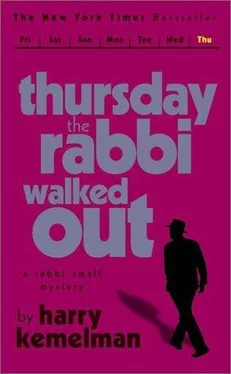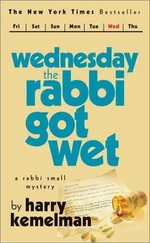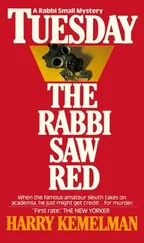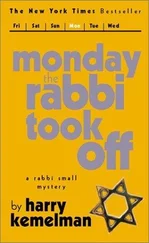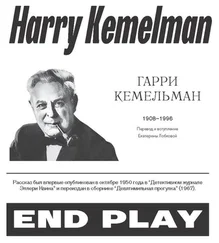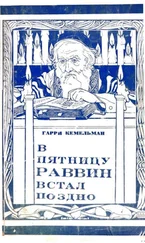Гарри Кемельман - Thursday The Rabbi Walked Out
Здесь есть возможность читать онлайн «Гарри Кемельман - Thursday The Rabbi Walked Out» весь текст электронной книги совершенно бесплатно (целиком полную версию без сокращений). В некоторых случаях можно слушать аудио, скачать через торрент в формате fb2 и присутствует краткое содержание. Жанр: Классический детектив, на английском языке. Описание произведения, (предисловие) а так же отзывы посетителей доступны на портале библиотеки ЛибКат.
- Название:Thursday The Rabbi Walked Out
- Автор:
- Жанр:
- Год:неизвестен
- ISBN:нет данных
- Рейтинг книги:3 / 5. Голосов: 1
-
Избранное:Добавить в избранное
- Отзывы:
-
Ваша оценка:
- 60
- 1
- 2
- 3
- 4
- 5
Thursday The Rabbi Walked Out: краткое содержание, описание и аннотация
Предлагаем к чтению аннотацию, описание, краткое содержание или предисловие (зависит от того, что написал сам автор книги «Thursday The Rabbi Walked Out»). Если вы не нашли необходимую информацию о книге — напишите в комментариях, мы постараемся отыскать её.
Thursday The Rabbi Walked Out — читать онлайн бесплатно полную книгу (весь текст) целиком
Ниже представлен текст книги, разбитый по страницам. Система сохранения места последней прочитанной страницы, позволяет с удобством читать онлайн бесплатно книгу «Thursday The Rabbi Walked Out», без необходимости каждый раз заново искать на чём Вы остановились. Поставьте закладку, и сможете в любой момент перейти на страницу, на которой закончили чтение.
Интервал:
Закладка:
Harry Kemelman
Thursday The Rabbi Walked Out
1
WHEN HER HUSBAND WAS PREPARING A SERMON. MIRIAM was careful to stay out of his way, not for fear of disturbing his train of thought, but lest she give him an excuse for interrupting his work. For David Small, the rabbi of Barnard's Crossing Conservative Temple, did not like to prepare sermons, or for that matter to preach them, he had begun as usual by laying out paper, sharpening pencils, adjusting the lamp—all to postpone the agony of beginning, he was thin and pale, and sitting over his desk, his shoulders had a scholarly stoop. His thin hair, which was beginning to gray at the temples, did not make him more distinguished looking, only older, he wrote a few words, peering down at the page nearsightedly through thick-lensed glasses, he crossed them out, drummed his pencil on the desktop, and then began to doodle, the sermon forgotten as he became completely engrossed in working out a complicated design of straight lines and loops, of circles and squares joined by cross-hatching, he as delighted when the doorbell rang. "I'll take it,” he called out from his study.
Hurrying in from the kitchen. Miriam said. "Don't bother. It's probably the newsboy come to collect for the week." But when she opened the door, it was to the pleasant ruddy face of Hugh Lanigan. Barnard's Crossing's police chief.
From behind her, the rabbi greeted him cheerfully. "Come in. Come in, Chief. Miriam was just going to make some coffee, weren't you, dear?"
Dutifully., Miriam said. "Yes. I put the perc on. Do come in." She could not refrain from adding. "David is working on a sermon, and I knew he'd want an excuse for stopping."
Lanigan smiled. "What's the matter. David? Having tough going with this one?"
"David has tough going with all his sermons." said Miriam tartly, she was small, and in sweater, skirt and loafers she might have looked like a teen-ager were it not that her face with its pointed chin showed maturity and determination, her mass of blond hair piled on her head, as though to get it out of the way, almost seemed to overbalance her trim little figure.
"That so? I would have thought you'd enjoy it." said Lanigan. "You can bawl them out and they can't answer back. It's a captive audience."
The rabbi grinned. "I don't care too much about bawling out people, especially when I'm all too conscious of my own shortcomings. Besides, it doesn't do any good, the sermon is just a kind of entertainment the rabbi provides to help pass the tedium of the service, actually, it's not even his traditional function. In the old days the rabbi didn't do it."
"You mean when a synagogue engaged a rabbi, they didn't expect him to preach?"
The rabbi shook his head. "It wasn't the synagogue that engaged him. It was the town or the community, and they engaged him to act as a judge and settle questions of law when they arose, the rest of his time he was supposed to devote to study."
"They'd pay him just to study?"
"Why not? Universities subsidize scholars. Why shouldn't a community?"
"I suppose, and he didn't have to preach at all?"
"His contract called for two sermons a year, on the Sabbath before Passover and on the Sabbath before tha Day of Atonement. But they weren't really sermons as you think of them, they were dissertations, like the lectures of a law professor, he didn't exhort the congregation, the kind you're familiar with, against sin, was usually given by an itinerant preacher called a maggid. Of course, nowadays, the rabbi, like the priest and the minister, is expected to give a sermon every week. Some rabbis like the idea. I suppose they have a knack for it, the poorest student in my class at the seminary now has one of the most prestigious pulpits in the New York area on the strength of it, he has a wonderful baritone voice and can bring tears to your eyes just—just reciting the alphabet, we called him The Voice."
"Reuben Levy?" asked Miriam. "The one who explained about the parables?"
The rabbi laughed joyously. "That's the one." To Lanigan he explained. "We were sitting around once, a bunch of seminary students and their wives, talking about sermons, because at the time we were being sent out to small communities for a Sabbath. Levy explained that in preparing a sermon he didn't search for examples and parables to illustrate some point he was planning to make, he worked it in reverse. When he heard a good story, he'd keep it in mind and then build a sermon around it."
"Like the fellow who got a reputation as a crackshot by firing first and then drawing a target around the bullet hole?" suggested Lanigan.
"Exactly!" said the rabbi.
As Miriam went out to the kitchen for the coffee, the rabbi went on. "My own sermons are always of the dissertation type. You see, three times a week we read portions of the Pentateuch, so I tie in my sermons with the portion of the week."
"Then you always have a subject." said Lanigan. "That should make it easy."
"True, but after all these years. I begin worrying that I might be repeating myself."
"Ah, well." said Lanigan as he accepted the coffee cup from Miriam, "have you ever thought that your congregation might not be listening anyway?"
The rabbi smiled sourly. "Thanks."
"No, but seriously, you’ve been here ten years now?"
"Twelve."
"So, if you were to give some of your old sermons, the ones you gave when you first came, who'd know the difference?"
"I'd know." said the rabbi.
"But look here, you say your sermons are like a professor's lectures, well, they give the same lectures year in and year out, don't they? I mean, a new class comes in and they have to cover the same ground. Now, I'll bet that in the twelve years you've been here, a pretty fair hunk of your original congregation has gone—died, moved away, retired to Florida, and a lot of new folks have come into town. So if what you told your original congregation was important for them to know, it's just as important for the new ones to know."
The rabbi nodded. "That's true enough. It happens gradually, so you hardly notice it, but it's true; there aren't many of the original members left."
"And a lot more of your people have moved into the area." Lanigan pointed out.
"We have almost three hundred families now." said Miriam.
"Three hundred?" Lanigan repeated. "I would have thought there were more than that in town."
"Oh, there are—in town." the rabbi agreed. "Maybe another couple of hundred families, but they're not members of our temple." He smiled. "If Henry Maltzman, our president, has his way, they'll all join up, he's very strong for building up the numbers." He laughed. "He's always talking about finding the right gimmick to do the trick."
"Well, why aren't they members? Now in our church when someone moves into the parish, the pastor or one of his curates calls on him, and if he doesn't show up, they keep after him. I'll bet there aren't a dozen Catholics in town who aren't connected with the church one way or another."
"Your religion is church oriented." said the rabbi. "It's built around the Mass and Communion and Confession, and these involve a priest in a church. Our religion is primarily centered in the home, the Sabbath is celebrated in the home, the Passover Feast takes place in the home. Besides, the financial structure of the two is different.
Ours is based on membership, and the annual fees of necessity come to several hundred dollars a year, that's a lot for a young married couple, and that's what most of the new people are, they came because they got jobs in the research labs and automated plants on Route ‘28."
"And a lot of those are cutting back." Miriam observed, "and some may go out of business altogether."
"You thinking of the Rohrbough Corporation?" asked Lanigan.
Читать дальшеИнтервал:
Закладка:
Похожие книги на «Thursday The Rabbi Walked Out»
Представляем Вашему вниманию похожие книги на «Thursday The Rabbi Walked Out» списком для выбора. Мы отобрали схожую по названию и смыслу литературу в надежде предоставить читателям больше вариантов отыскать новые, интересные, ещё непрочитанные произведения.
Обсуждение, отзывы о книге «Thursday The Rabbi Walked Out» и просто собственные мнения читателей. Оставьте ваши комментарии, напишите, что Вы думаете о произведении, его смысле или главных героях. Укажите что конкретно понравилось, а что нет, и почему Вы так считаете.
